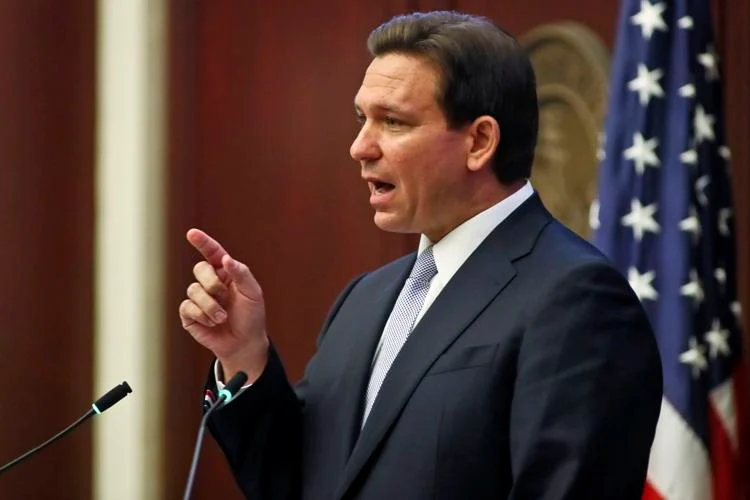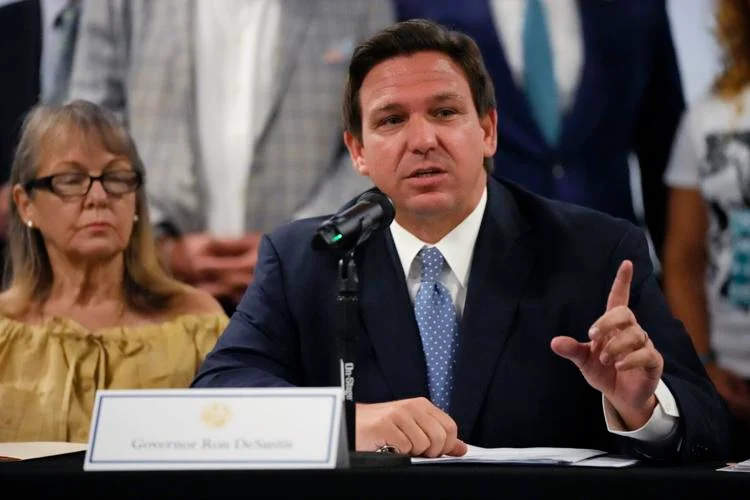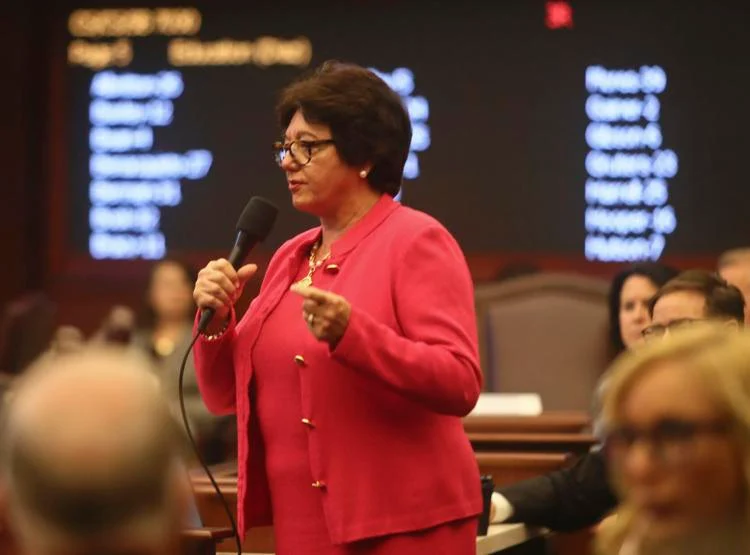Ron DeSantis signs massive education savings account expansion

Florida Gov. Ron DeSantis signed a bill that expands the state’s education savings account program to all of the state’s school children at a ceremony in Miami on Monday. House Bill 1 will eliminate financial eligibility restrictions and the current enrollment cap when it goes into effect on July 1. “Today’s bill signing cements us in that number one position, because we will be signing legislation which will represent the largest expansion of education choice, not only in the history of this state, but of these United States,” DeSantis said. Florida is ranked first in the country for parental power, according to the Center for Education Reform, and is ranked first for education freedom, according to the Heritage Foundation. According to state officials, there are 1.3 million students who participate in school choice already in Florida, a number larger than the entire K-12 student populations of 35 other states. DeSantis noted that Florida is also top-ranked in regard to student scholarships and provides more resources to parents who wish to homeschool their children. Scholarships include the Family Empowerment Program and Education Savings Accounts. Eligible students can claim up to $8,000 per year and are able to spend the funds on educational resources or private tuition and private schools. “House Bill 1, it expands school choice to every single student in the state of Florida, and it does that by eliminating the current financial eligibility restrictions and allowing any student who is a resident of Florida and eligible to enroll in K-12 to participate in school choice scholarships,” DeSantis said. Low and middle-income families will have first priority, however, DeSantis stated that education funding should follow the student, regardless of family circumstances. The bill will also help create an online portal for parents to choose the best educational options for their student and aids in eliminating barriers and red tape for teachers. “This bill is a major game changer I think that yet again we are leading the country when it comes to things like education choice,” DeSantis said, adding that the bill is all about results. DeSantis said that Florida has proven that more choice in schools and more power given to parents to direct their child’s education has positive results on student outcomes. Florida House Speaker Paul Renner, R-Palm Coast, stated that everyone should be proud of the progress education has made in the Sunshine State. “With the governor’s support and signature today, Florida delivers the largest expansion of educational freedom in our nation’s history. That’s something we should all be proud about,” Renner said. Renner also added that HB 1 allows children to be educated in environments that are in line with their values and beliefs. “We don’t want your child to go to a school where their values are mocked and held up in derision…educational choice also means you have the ability to have your child to go somewhere where they learn all the basics, but they also have their values and their faith respected,” Renner said. Republished with the permission of The Center Square.
Florida’s Ron DeSantis, legislative leaders push for reforms against frivolous lawsuits

Florida Gov. Ron DeSantis and legislative leaders want reforms to take on frivolous lawsuits and put a stop to what the governor calls “predatory” practices by trial lawyers. DeSantis held a news conference in Jacksonville Tuesday with House Speaker Paul Renner, R-Palm Coast, and Senate President Kathleen Passidomo, R-Naples, about the proposals which would eliminate one-way attorney fees and fee multipliers for all lines of insurance, modernize Florida’s “bad faith” law, and put caps on damage claims to protect small businesses. “There are things in the law that are trying to create opportunities to bring cases,” DeSantis said. “One of the reasons our auto insurance rates are higher here is because there’s a lot of cost of litigation embedded in these auto insurance premiums.” DeSantis noted the stark difference between what the client receives, and what their lawyer receives. “So, there was one case where the client was awarded $216.67, and the lawyer got over $100,000 in fees,” DeSantis said. “There was one case with $2,114.55 awarded to the client, and the attorney was able to recover almost eight times the amount that the client did.” House Speaker Renner supported the changes and said the new proposals will level the playing field for legitimate claimants. “This is really about bringing things into balance,” Renner said. “We want people with legitimate claims to bring those claims, but you should never have a situation where a client gets 200 bucks, and the lawyer gets a hundred thousand bucks.” Senate President Kathleen Passidomo spoke about rising property insurance costs and the legislation passed in December’s special session to combat it. She says a large part of the reason why costs are becoming unmanageable is the cost of litigation and lawyers using the system for their own gain. Passidomo noted that most lawyers in Florida perform their jobs well, but a small number of them chase fees through suing insurance companies. She also pointed out that those types of lawyers do not mention their clients’ needs once, nor do they properly represent them. “We have to stop that practice,” Passidomo said. “The Florida Bar regulates them and has done nothing to stop the practices that they have employed. If the Florida Bar doesn’t do it, then we’ll have to.” Passidomo further stated that the changes put in place will be to protect Floridians and their interests. “We are going to work through these issues, and we’re going to come up with some legislation to protect you, to protect your businesses, and to protect those people that actually have cases…from the lawyers that are just doing it to raise fees,” Passidomo said. Republished with the permission of The Center Square.
Florida House Speaker Paul Renner unveils constitutional carry legislation

Florida House Speaker Paul Renner, R-Palm Coast, held a news conference in Tallahassee Monday to discuss a measure that would remove Florida requirements for a firearms permit and training to carry a concealed firearm. Renner was joined by state Rep. Chuck Brannan, R-Lake City, state Sen. Jay Collins, R-Tampa, Hernando County Sheriff Al Nienhuis —who is the president of the Florida Sheriffs Association — and Brevard County Sheriff Wayne Ivey. Law enforcement and the Legislature want law-abiding citizens to be able to exercise their rights to bear arms, and House Bill 543 expands this. The bill will also end “gun-free zones” and, if passed, Florida will become the 26th constitutional carry state. “Central to the idea of freedom is the right that we can defend ourselves against physical attack as well as defend those that we love,” Renner said. “The Constitution did not give us those rights, our creator gave us those rights, but it does put it down on paper in the Second Amendment, and the courts have interpreted that to mean an individual right to keep and bear arms for self-defense.” Renner further added that these rights should be available to everyone, despite color, creed, or political affiliation, and that the Legislature will be removing the “government permission slip” that prevents people from exercising their rights. Hernando County Sheriff and Florida Sheriffs Association president Al Nienhuis said that criminals don’t bother with getting permits for their firearms before they commit crimes, so law-abiding citizens should not have to have one either. “We can use the premise that, just like people who are accused of crime, are innocent until proven guilty,” Nienhuis said. “I think we can assume that our citizens are going to do the right thing when it comes to carrying and bearing arms.” Nienhuis also added that the actions of criminals should have no bearing on the rights of individuals. “When somebody does commit a violent crime… they’ll be held accountable but not at the expense of the freedoms of those individuals who want to protect themselves,” Nienhuis said. Ivey added that the move towards constitutional carry shows that Florida is the “Freedom State” and thanked Governor Ron DeSantis, Speaker Renner, and the Legislature for making it happen. “Our citizens have the right to protect themselves at all times,” Ivey said. Brannan said he applauds the joint efforts with lawmakers and law enforcement to make this bill come to fruition. “The bill that I will file later today continues to advance Second Amendment freedoms through legislation known as constitutional carry,” Brannan said. “I believe Floridians have the right to bear arms to protect themselves, their families, and their property without government interference,” Brannan said. Brannan added that those citizens who are already prohibited from having a firearm will continue to be prohibited under this bill. Citizens will also still be able to apply for concealed carry permits, particularly for those who travel out of state with their firearms. Republished with the permission of The Center Square.
Florida could lower abortion ban from 15 weeks to 12 weeks

Changes could be coming to Florida’s abortion laws after the incoming senate president, Sen. Kathleen Passidomo, said she would like to see Florida’s abortion ban go from 15 weeks’ gestation to 12 weeks’ gestation. The state of Florida banned abortion in 1900, but that ban was overturned in 1973 by the U.S. Supreme Court in the Roe v. Wade case. That ruling itself was overturned by the Supreme Court in June. Anticipating that decision, Florida Gov. Ron DeSantis moved to ban abortions from 15 weeks’ gestation, with the law making no exceptions for cases pertaining to rape and incest. At the signing of the bill, DeSantis said, “House Bill 5 protects babies in the womb who have beating hearts, who can move, who can taste, who can see, and who can feel pain. Life is a sacred gift worthy of our protection, and I am proud to sign this great piece of legislation, which represents the most significant protections for life in the state’s modern history.” Abortion changes had already happened in June 2020 when DeSantis signed a law that states minors must provide written permission from a parent or guardian to have an abortion. Founder and executive director of Florida Voice for the Unborn, Andrew Shirvell, told The Center Square that lowering the ban from 15 weeks to 12 will not change abortion rates in Florida, as most abortions are sought before then. “The vast majority of abortions in Florida take place prior to 12 weeks gestation. Accordingly, a new Florida law banning abortions after 12 weeks gestation – as opposed to 15 weeks gestation – would do almost nothing to curb Florida’s horrendous abortion rate,” Shirvell said. “Moreover, permitting an unborn child to be killed via abortion after 12 weeks gestation, if the child was conceived as a result of rape or incest – as Senator Passidomo apparently wants to do – is a step backwards, since the 15-week abortion ban does not allow for those so-called ‘exceptions.’” Shirvell added there should be no reason why Florida couldn’t completely ban abortion since Roe is now overturned. “Prior to the U.S. Supreme Court’s reversal of Roe v. Wade earlier this year, enacting a 12-week abortion ban might have made sense. Such incremental measures, including ‘Heartbeat’ laws prohibiting abortions after six weeks gestation, were designed, in part, to challenge Roe. Now that Roe has been overturned, Florida and her sister states have been given the green light to completely protect all unborn children from conception,” Shirvell added. Nearly a dozen Republican-controlled states have done that already. he noted. The new speaker of the Florida House, Palm Coast Republican Paul Renner, said that the Republican supermajority in Florida will likely lead to more pro-life legislation in the future. “I want to see us move in a pro-life direction, but I’m also sensitive to the fact that 50 years of Roe v. Wade has developed a culture and an expectation around this issue that is not going to change overnight, and I say that as some who believes that life begins at conception,” Renner said during his first on-camera appearance since becoming speaker. “We have 85 members, we have supermajorities in the House and Senate, and I can tell you they are pro-life majorities, I’m pro-life, I’d like to see us move in a pro-life direction,” Renner said. “I think we need to look at how we can balance some of those interests, and so we will take a look at where everybody is in the caucus.” Republished with the permission of The Center Square.


